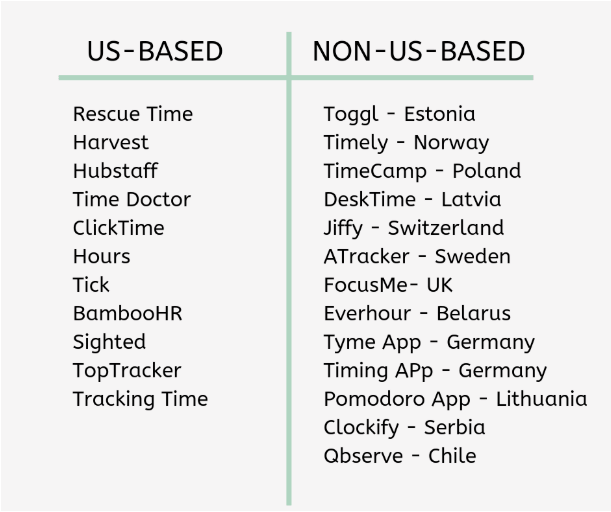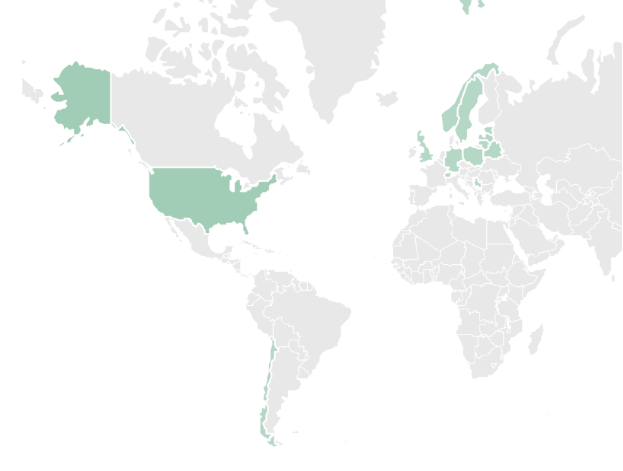It seems that the US and Northern Europe are the most concerned about time tracking and productivity. Concerned enough, that is, to create their own time tracking apps and sell them to the rest of the world.
In an eye-opening study, we found that of the most popular time tracking apps, 44% are from the USA, and an equal 44% are from the Northern-half of Europe, while the remaining 14% are from elsewhere in the globe.
How is it that these two regions are so clearly the leaders in time tracking app creation? And how is it that this trend has escaped public attention?
What we found
Working on a daily basis with time tracking apps and searching for best case practices, my team and I repeatedly kept coming across other time tracking apps that were from our region (Northern Europe).
It got to the point where we had to ask the obvious question – is it possible that the Northern part of Europe is churning out all the time tracking apps? Is this a local and geographical phenomenon? We had to get to the bottom of this.
We Googled “time tracking app”, and wrote down the top 25 apps, and segmented them between originating from the USA and outside of the USA.
 We found that roughly half were from the States, while the other half, elsewhere.
We found that roughly half were from the States, while the other half, elsewhere.
The next step was to put them on a map. This is where it got interesting:

It appears that the great majority of time tracking apps that aren’t from the US are mostly congregated in the Northern-half of Europe.
Our hunches were founded.
Of course, there are some exceptions, such as Qbserve from Chile and Clockify from Serbia, but these are negligible deviations from the norm. The rest are very obviously from the same geographical clump of space.
Though the United States is obviously the country with the most time tracking apps founded, the majority of the other apps are congregated in a geographical area of a similar size.
This begs the question – what’s the deal with that?
To get to the bottom of this, we first have to consider the reasoning for productivity apps. Are these regions more concerned about raising their productivity? Are they more introspective about their output than other countries? Do they have problems with employee productivity, thereby provoking the creation of these apps?
The investigation continues.
Are there productivity problems in these countries?
To consider if these countries have HR productivity problems that prompt the creation of these apps.
In an article by Time where countries are ranked by the amount of GDP created per hour of work, our list of leading countries is strongly represented near the top of the table, with the US ranking 5th, and the remaining 9 countries of the top 10 are from a similar geographical area – the Northern part of Europe. Those countries include Luxembourg, Ireland, Norway, Belgium, Denmark, France, Germany, the Netherlands, and Switzerland.
Therefore we can conclude that the creation of the apps is not spurred on by a national productivity problem. In fact, it may be quite the opposite. It seems that productive countries seem to be more invested in continually growing their productivity, thereby perhaps prompting a self-fulfilling prophecy.
But why Northern Europe?
To find out from the source itself, we got in touch with some of the apps in question. Did they create apps because of low productivity? What was the reasoning behind it?
We got in touch with Artis Rozentals, CEO of DeskTime (based in Latvia). To comment on the creation of DeskTime, he mentioned:
“DeskTime was created originally as an internal tool for the Draugiem Group. In Latvia, it’s legally required for businesses to track employee working hours. As a technologically progressive company, it seemed archaic to have typical “clocking in” solutions, like punching in time or even electronic access cards. So we created a smarter solution that tracks the arrival and leaving time automatically. After seeing the demand for it, we later made the product publicly available.”
Here we see that it’s a mix of both legal requirements and company culture.
While founder and CEO of Timely Mathias Mikkelsen, (based in Norway) stated that he created his app out of frustration with the current system:
“It was hate, not love, that drove me to create Timely. Working in an agency, I was so broken by the pointlessness and inaccuracy of manual time tracking, that I set out to rid the world of it – definitively. I was sick of apps that just simplified the problem; I wanted to remove the need to consciously track time in the first place.”
This leads us to the next hypothesis – perhaps time tracking apps are created by those, who feel the pain of the existing system. In Northern Europe – it’s a necessity to track time with less friction.
In the USA, however, we found that there could be an entirely different, regulatory and capitalistic reason for this.
In the USA, it’s been stated that regulated overtime payments are one of the heftiest bottom-line business expenses. Thereby making it highly motivating to have an accurate statement about how many hours an employee has, in fact, worked.
It turns out that some countries, such as Spain, do not have any legal requirements as to time tracking or overtime payments. Their supreme court ruled that companies do not have to have records of working hours unless overtime is conducted. This certainly does not incur an environment that stimulated the development of time tracking apps and could explain the lack of such being developed in Spain.
Thus, we can see that time tracking apps are certainly more popular in countries where there are legal requirements or substantial financial implications from having accurate records of worked hours.
Conclusion – business losses, culture, and law
The conclusion that can be drawn is that there are a variety of factors that have driven the regions of the United States and Northern Europe to become leaders at putting out time tracking apps.
Those reasons include:
- Financial incentive
- Legal requirements
- Ease of use
While we can’t say for certain that other countries don’t have financial incentives to turn to precise time tracking, or are not concerned with the ease of use that automation provides, we can say that it seems to be a combination of all of the above that pave the way for enterprising individuals to decide to build and sell their own productivity apps.
About the Author
 Julia Gifford is a Canadian-born tech enthusiast and writer. She has a passion for getting the word out about deserving Baltic startups. Connect with Julia on Twitter.
Julia Gifford is a Canadian-born tech enthusiast and writer. She has a passion for getting the word out about deserving Baltic startups. Connect with Julia on Twitter.




